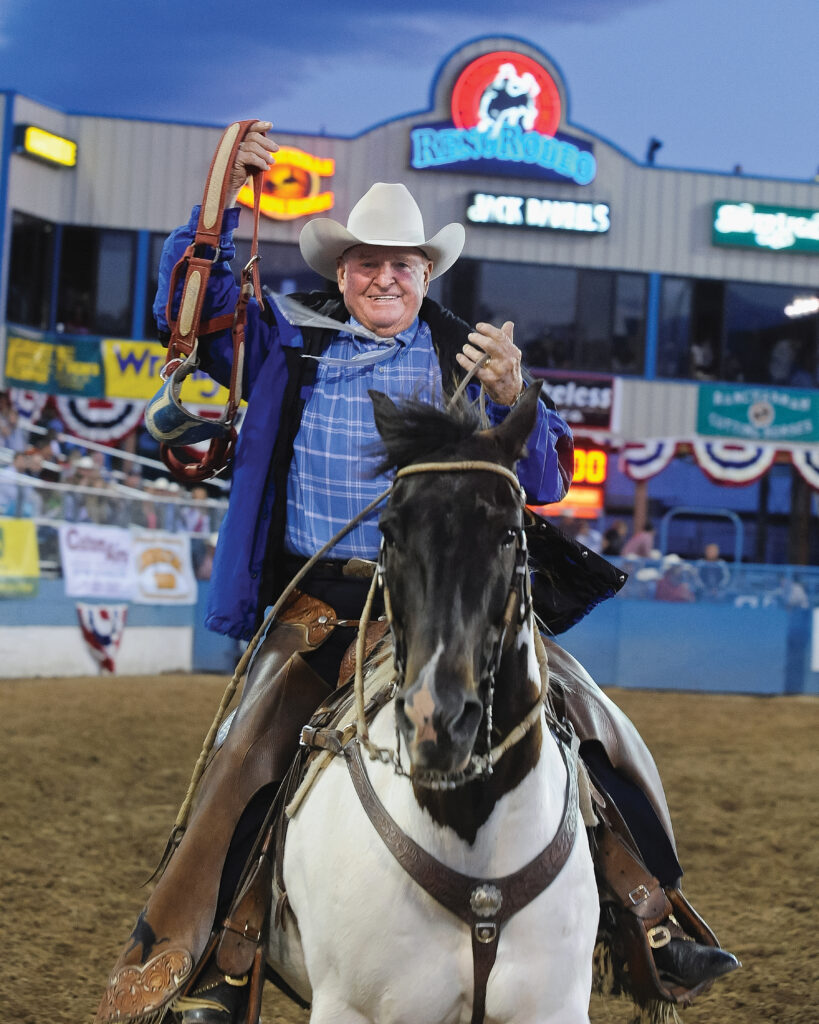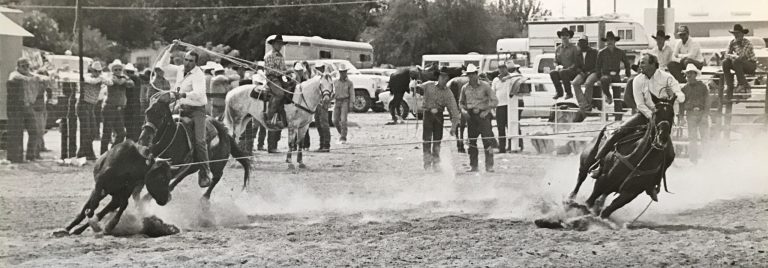
I grew up in Southern California, and when I started rodeoing, a lot of the rodeos we went to were in California. Cotton Rosser ruled California, so that meant a lot of Rosser rodeos. Cotton was famous for barking orders and telling the timed-event guys to hurry up, so they wouldn’t hold up the show. So early on in my career, I was a little leery of him. But over the course of my career, I grew to appreciate Cotton and all he did for cowboys. We lost Cotton this summer, and I’m old and wise enough now to know there will never be another one like him.
One of my favorite Cotton Rosser memories was in Jake (Barnes) and my heyday. We were chartering from Bakersfield slack in the morning to the rodeo over the hill in Lancaster. We’d called ahead to the rodeo secretary to see if someone could pick us up at the airport. When we got to Lancaster, low and behold, there was Cotton Rosser himself. He greeted us with, “Come on, boys,” and away we went to the rodeo.
My whole perspective of who Cotton was changed, and that wasn’t the only time he helped us out. There was another time we were going from the Salinas (California) perf to the perf at Ogden (Utah). Cotton always had Ogden, and guess who was there to pick us up—Cotton.
We all have first impressions and hear stories about people. But as you live your life, you get to see all aspects of the people in the rodeo business. After not being sure about him at first, I came to respect and love Cotton Rosser for the icon and legend he was. He promoted rodeo and all that went with it—the cowboys, the stock, the whole show. Cotton was so proud of our rodeo heritage.
We all knew we were going to be challenged in the timed events at a Cotton Rosser rodeo. The calves and steers were on good spring grass in Marysville (home of Flying U Rodeo), and for a lot of years the team roping steers were last year’s bulldoggers.
Cotton wanted his rodeos to always be running on time, and he always had a good crew over the years. Everybody knew their job, they were good at their job and they hustled. Cotton always maintained a good outfit. Generally speaking, stock contractors produce the rodeos, so they rule the roost. When you start rodeoing, you have to learn the ropes, and the rodeo secretaries and producers go hand in hand.
Rodeo is a traveling family. I didn’t know Bennie Beutler for a long time, even when I went to a lot of his rodeos. After I’d rodeoed for seven or eight years, we were at the perf in Oklahoma City. The first bucking horse hung a leg in the bucking chutes. I was in the calf roping and team roping, so was right there watching. Bennie looked straight at me and said, “Clay, figure out how to get this horse out of there.” We went to scrambling for tools to get his foot pried out of there, and the rodeo was able to go on without delay. Ever since then, I’ve had a different relationship with Bennie Beutler.
Same with Mike Cervi Sr. (Clay’s first wife) Beth and Sherry (Cervi) were very close friends. When Mike Jr. passed (in a plane crash; he was married to Sherry at the time), then Beth passed not too long after that, it created a bond between Mike Sr. and me, because we both lost loved ones. Mike was always there at the roping chute wearing a nice suit, and a lot of times he climbed into the chute and pushed my steer in a suit, without me even asking.
I have a lot of respect for rodeo contractors. They’re mostly family-run businesses, and people work so hard to put on a good show. The stock, the traveling and production include a lot of puzzle pieces. You have to hand it to the Rossers, Beutlers, Cervis and guys like John Growney, who’s an absolute gentleman of a guy. They made it possible for me to live my dream, and I hate to see that great generation in rodeo go.











